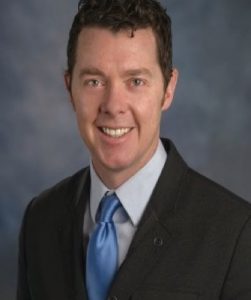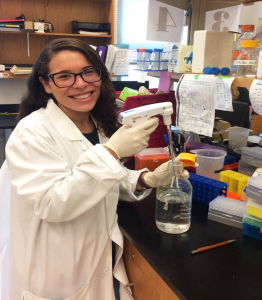
June 21, 2017: IMSD + B&B Career Panel
IMSD Fellows and B&B Students, take a look at our panelists for the IMSD Career Panel on June 21, 2017, at Student Center East, room 216 from 12:30 PM to 3:30 PM.

Linda Qi Beach grew up in a southwest suburb of Chicago, Illinois, and stayed in Illinois to attend the University of Illinois- Urbana/Champaign for her Bachelor of Science in molecular and cellular biology. While in college, Linda fell in love with neuroscience and spent most of her free time working in a honeybee research laboratory that investigated the neural pathways driving plasticity in learning and memory. She stayed in the Big Ten and went on to obtain her Ph.D. in neuroscience from Michigan State University, where she studied the neurobiology of sex differences in brain and behavior in zebra finches. Linda was recently recruited to the Atlanta area to begin a Next Generation Scholar post-doctoral fellowship in the Center for Behavioral Neuroscience. She joined BrainWheel to diversify her skill set beyond the laboratory bench and to acquire new experiences in science consulting. She aims to bring her love of collaboration, attention to detail, and problem-solving to her projects at BrainWheel. Outside of science, Linda enjoys perusing through food magazines for her next culinary challenge, making a mess while drawing with charcoal, and sweating out said food challenges at Bikram yoga. She also loves marine life and is proud to be a part of the volunteer program at the Georgia Aquarium.
Bonnie Daneker is CEO of Write Advisors, inspiring others to write, produce, and distribute work in the nonfiction genres of business, biography, and health &wellness. Her client base works in print, video, mobile technology, and social media. A significant portion of her business supports authors of scientific and medical topics.
Motivated by her father’s illness to help others, she has authored six books in The Compassionate Caregiver Series®. In 2015, she co-authored the Enterprise Clinical Research Plan for Cancer Treatment Centers of America (CTCA). She is an expert contributor for www.Caring.com.
She co-edited CLIMB: Leading Women In Technology Share Their Journeys To Success to showcase Atlanta’s technology talent, resulting in her former role as Program Director in Thought Leadership with Women in Technology (WIT).
She has been seen on “Atlanta & Co,” PBS’ “The Dream Show” with Kathleen Kiley, and “Transformational Leadership” with Henna Inam.
A working writer who encourages entrepreneurship, she is currently collaborating on the product history of Prego Spaghetti Sauce. You can follow her on Twitter @BonnieDaneker and Instagram @bbdaneker.
Roby Greenwald is an assistant professor in the Division of Environmental Health at the School of Public Health where he joined the faculty in fall 2014.

Roby Greenwald’s primary research interests are measuring the ways in which air pollution influences human health, and much of his work involves the development of unique sampling systems for assessing exposure to air pollution in special microenvironments such as inside vehicles while commuting.
From 2009-2014, He was on the research faculty of the Department of Environmental Health at Emory University. From 2005 to 2008, He was a post-doctoral fellow in Emory’s Department of Pediatrics and worked on a project investigating the influence of air pollution exposure on pediatric asthma patients. From 1999-2005, He was a Ph.D. student at Georgia Tech and worked on two projects: development of an instrument to measure water-insoluble aerosols in real-time and computer modeling of the influence of atmospheric particulate matter on crop production.
Prior to graduate school, He taught beekeeping as a Peace Corps Volunteer in Benin, West Africa (1995-1998) and studied civil engineering at Clemson University (1990-1994).

Dr. Yvonne Ogbonmwan is a postdoctoral fellow at the Grady Trauma Project at Emory University, a lab led by Dr. Tanja Jovanovic. She is currently studying the neurobiology that underlies PTSD in victims of inner-city violence. Her project focuses on the interaction of traumatic experiences on neurophysiology in mental disorders such as PTSD, depression, and addiction. She conducts her research by administering standardized clinical interviews and psychophysiological tests (e.g. acoustic startle response, skin conductance response, heart rate variability). In 2015 Dr. Ogbonmwan completed her doctorate studying behavioral and pharmacological interventions for cocaine relapse under the guidance of Dr. David Weinshenker.

Benjamin Stoff, MD, MAB is Assistant Professor of Dermatology at Emory University School of Medicine. He practices general dermatology and dermatopathology at Emory and teledermatology consultation through the Atlanta VA Medical Center. Dr. Stoff earned a Master of Arts in Bioethics at Emory Center for Ethics, where he serves as a faculty fellow. His primary scholarly interest involves the application of bioethical theory to the unique moral challenges affecting dermatologists and other ambulatory healthcare providers. He has other interests in global health service work, bioethics and other medical pedagogy, process improvement in dermatology and dermatopathology, melanoma, and psoriasis.

Gregory (Greg) Suess received his B.S. degree in Biological Sciences and Psychology in 2013 at Florida State University. He started his first lab experience with Michael Meredith investigating neuromodulators in the medial amygdala in golden hamsters. He then moved on to Karen Berkley’s lab as lab manager. In Dr. Berkley’s lab he helped conduct research on the mechanisms of peripheral pain; specifically sex and age differences in gynecological pain associated with endometriosis. Greg joined the Neuroscience Institute in 2014 and is currently a member of the Frantz lab. He hopes to study the deficiencies in the aging brain and how to combat issues created from senescence in the nervous system. Besides science, Greg enjoys playing watching sports, reading, and playing video games and chess.

Arielle Valdez is rising fifth year MD/Ph.D. Candidate at Emory University; she is currently pursuing her Ph.D. in Neuroscience in the laboratory of Gary Bassell, Ph.D. Her work focuses on the molecular mechanisms involved in Fragile X Syndrome, the most common genetic form of autism. Arielle received her BA degree in Neuroscience from Boston University in 2013. While at Boston University, Arielle investigated hippocampal time cells under the advisement of Howard Eichenbaum, Ph.D. through the Boston University Summer Undergraduate Research Fellowship (SURF) program. Arielle continued to work in the Eichenbaum lab throughout the remainder of her undergraduate career and ultimately completed a senior thesis in the lab. Additionally, in the summer of 2011, Arielle participated in the Howard Hughes Medical Institute Exceptional Research Opportunities Program at the Johns Hopkins University School of Medicine in the laboratory of Richard Huganir, Ph.D. In the Huganir lab, Arielle studied yeast two-hybrid screens in search of novel interactors with Neuroligin-3, a postsynaptic adhesion molecule linked to Autism Spectrum Disorder. To pursue clinical experience prior to medical school, Arielle interned in the Neurology department at the Boston Veterans Affairs Hospital in the summer of 2012. Arielle matriculated into Emory University’s MD/Ph.D. program in 2013.
Arielle currently researches the ubiquitination of the Fragile X Mental Retardation Protein following neuron stimulation and the downstream consequences on protein synthesis and neuron morphology. When her training is completed, Arielle hopes to be able to practice medicine and actively contribute to patient care while still participating in bench research.


